A Note from A Chronic Voice: To open, I’d like to thank Lucjan for contributing this guest post. I especially love to hear from men within the community, as their voices are pretty rare, yet vital. Lucjan is a caregiver, whose wife is chronically ill with fibromyalgia and endometriosis. Read on to find out more about the challenges, rewards and his best tips on being a caregiver to a chronically ill loved one!
Table of Contents
Introduction
When most people think of caregivers, they think of elderly parents being cared for by their adult children. However, caregivers come in all shapes and sizes. There are also many young caregivers who are providing care for chronically ill spouses, partners, siblings, or friends.
I am one of those caregivers. My wife has two chronic conditions that require support. Maybe it is not around-the-clock care because she is fairly independent, but it’s care nonetheless, which can be exhausting, both physically and emotionally.
Caring for a chronically ill person can be very challenging. Being a caregiver for disabled kids and young adults by profession, I have a lot of experience with this. One of the hardest things is that you never know what to expect.
Before I continue, I’d love to give a BIG thank you to Sheryl for allowing me to contribute to her work and for acknowledging us – caregivers. Sheryl is is a beautiful person with a warm heart, who cares deeply about others.
So thank you, Sheryl!
Pin to Your Chronic Illness & Caregiver Boards:
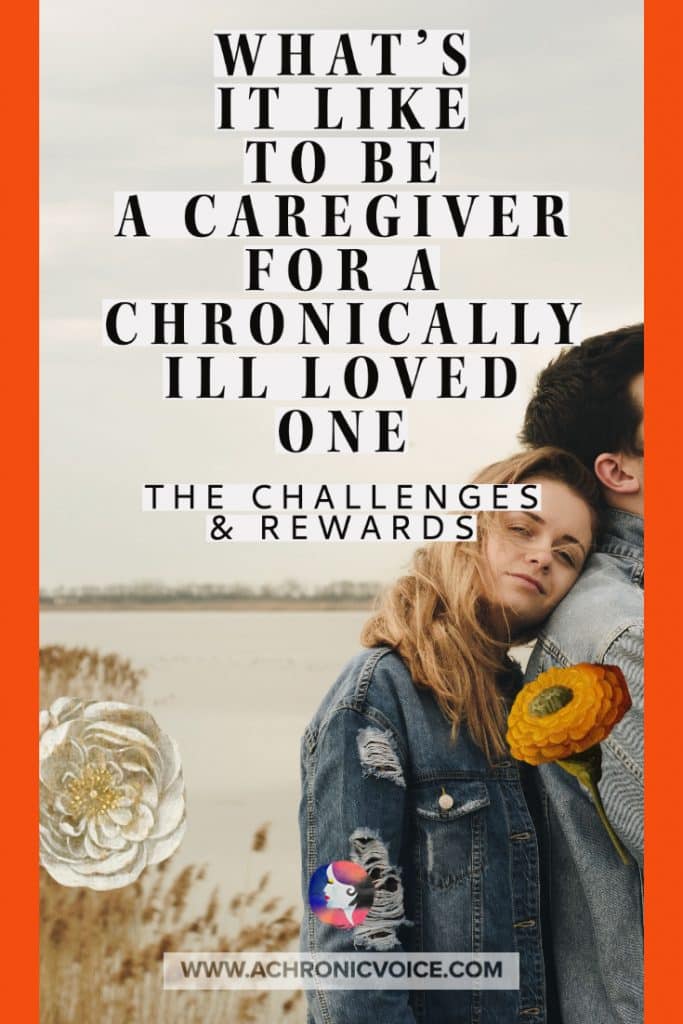
What’s it like to be a caregiver for a chronically ill loved one?
The person you are caring for may have good days and bad days. They may be in pain or uncomfortable a lot of the time. You may need to help them with basic activities of daily living such as eating, going to the bathroom, or getting dressed.
You may also need to help them manage their medications and schedule doctor’s appointments. In some cases, you may need to provide transportation to and from appointments. You may also need to be their advocate, communicating with their healthcare team and making sure they are getting the care they need.
My wife lives with constant pain and fatigue. If it’s not her primary condition – endometriosis, it is because of another – fibromyalgia. Endometriosis and fibromyalgia, are lifelong conditions with no cure.
Caring for a chronically ill person can be emotionally draining. You may feel guilty, even resentful, or angry at times. You may feel like you are not doing enough or that you are failing.
You may feel like you constantly stepping on eggshells around the person you are caring for, worried about upsetting them.
This is the hardest part of being a caregiver for me – the emotional roller coaster. One minute I am feeling great about how well my wife is doing and the next minute I am feeling down about how her chronic illnesses are impacting her life.
The inevitable conflicts
My wife tried to commit suicide on two occasions, she also asked me to divorce her for the sake of my happiness. She thought that I wasn’t happy, that she was a burden to me, and that suicide was the only option to help me live my life and to escape her own pain.
Whenever I was at work, I had conflicted thoughts. I knew that she was safe being with her mum at home, but at the same time, her mother didn’t know her daughter’s thoughts the way I did.
Despite all of these challenges I stood by her, and never left her side. I showed my wife my true colors and let her know that I would always be there for her, no matter what happened. I think that this is one of the key things that has helped us get through tough times.
We need a voice!
Society expects caregivers like me (especially men) to be strong and stoic. We are not supposed to show any emotion or weakness. This is especially hard for men because we are not used to talking about our feelings.
“#Society expects #caregivers like me (especially #men) to be strong and stoic. We are not supposed to show any emotion or #weakness. This is especially hard for men because we are not used to talking about our #feelings.” Click To TweetBut the truth is, we need a voice! We need to be able to talk about our experiences and how we are feeling. We need support from family, friends, and our community.
This is why I decided to be a voice for those loving men who care for women with endometriosis and fibromyalgia. Because I want them to know that they are not alone.
The ups and downs of caring for a chronically ill loved one
There are various challenges but there are also rewards in loving a chronically ill person. I expand on both below. I’m going to name five of each category.
The challenges include:
- The emotional roller coaster
- The physical toll
- The financial burden
- The social impact
- The feeling of isolation
The rewards include:
- The feeling of satisfaction
- The sense of purpose
- The opportunity to learn
- The deepening of your relationship
- The chance to make a difference
If you feel like caring for your partner becomes too much, you will have to set some boundaries. This can be difficult, but it is necessary in order to protect your own well-being.
You need to make sure that you are taking care of yourself, both physically and emotionally. This means getting enough sleep, eating a healthy diet, exercising regularly, and making time for your own hobbies and interests.
It is also important to talk to someone who understands what you are going through. This could be a friend, family member, therapist, or support group for caregivers.
If you are the caregiver for a chronically ill person, know that you are not alone. There are others out there who understand what you are going through. Seek out support and care for yourself so that you can continue to be the best caregiver possible.
“If you are the #caregiver for a #chronicallyill person, know that you are #notalone..Seek out #support and care for yourself so that you can continue to be the best caregiver possible. #carer #ChronicIllness” Click To TweetPin to Your Carers, Society & Humanity Boards:
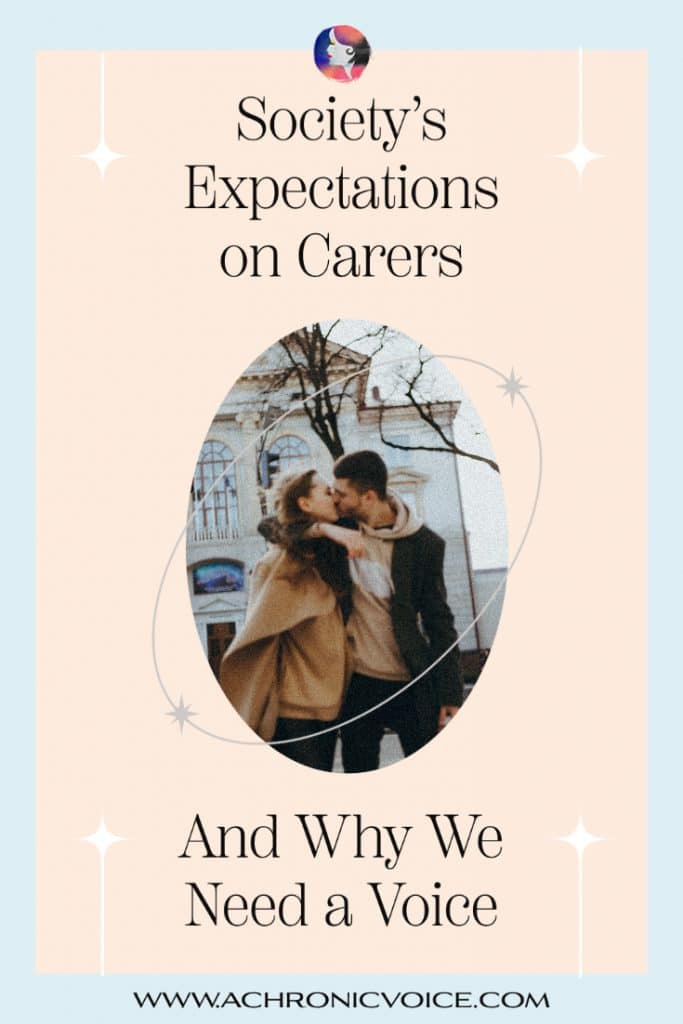
The challenges
The emotional roller coaster
The hardest part of being a caregiver is the emotional roller coaster. One minute you may feel great about how well your loved one is doing and the next minute you may feel down about how their chronic illnesses are impacting their life.
You may feel happy and like things go well, and then suddenly things can change, making you feel guilty, resentful, or angry at times. You may feel like you constantly step on eggshells around the person you are caring for, worried about upsetting them.
The physical toll.
Caring for a chronically ill person can be physically demanding. You may need to help them with basic activities of daily living such as eating, going to the bathroom, or getting dressed. Even though this may not be the case for every relationship, it is something that can take a toll on the caregiver over time.
You may also need to help them manage their medications and schedule doctor’s appointments. In some cases, you may need to provide hands-on care such as wound care or giving injections.
It all depends on the circumstances but caring for a chronically ill loved one can still be physically demanding and exhausting.
The financial burden.
Living with a chronic illness can be expensive. The cost of medications, doctor’s appointments, and treatments can add up quickly. In some cases, you may need to miss work to provide care, which can impact your income.
“Living with a #chronicillness can be expensive. The cost of #medications, doctor’s appointments, and treatments can add up quickly..you may need to miss work to provide care, which can impact your income. #carer #DisabilityTwitter” Click To TweetI had to miss work on many occasions to support my wife who struggled to get out of bed. Aside from pain, chronic fatigue is one of her main symptoms.
When the pain and fatigue disable your loved one, and you have to prioritize your partner’s well-being, work can take a backseat. Financially, this can be challenging as it may mean less income for the household.
The social impact.
Caring for a chronically ill person can have a negative impact on your social life. You may find yourself canceling plans or avoiding social activities. You may feel like you are missing out on important life events such as birthdays or weddings.
Plans often change. For example, you may have made plans to go out for dinner but then your loved one has a flare-up and isn’t feeling well. You may end up staying home to take care of them.
The feeling of isolation.
Caring for a chronically ill person can be isolating. You may feel like you are the only one who understands what you are going through. You may feel like no one else can relate to your experiences.
And this is true, because in the same way as I will never be able to fully grasp what my chronically ill wife is going through, she will never understand my perspective. The variety of conflicting emotions caregivers like me go through is incomparable to anything else.
Pin to Your Caregiving, Relationship & Chronic Illness Boards:
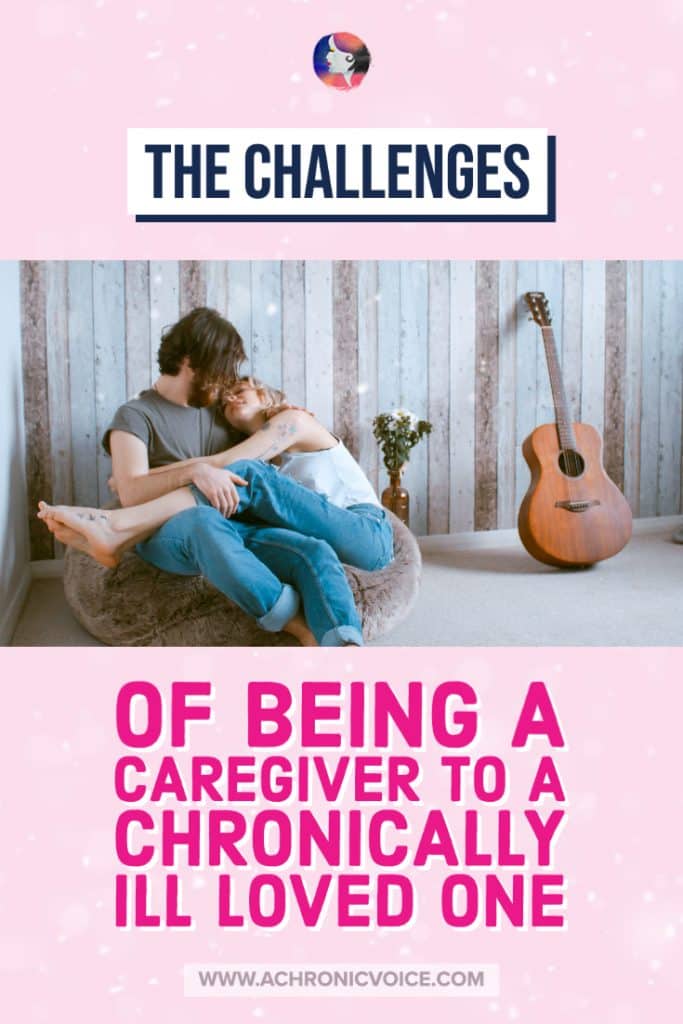
The rewards
The feeling of satisfaction.
Despite the challenges, there are also rewards to being a caregiver. One of the biggest rewards is the sense of satisfaction you feel when you are able to help your loved one manage their chronic illness and improve their quality of life.
You may also find a sense of purpose in your role as a caregiver. You may feel like you are making a difference in the life of someone you love.
The sense of purpose.
Loving someone with a chronic illness can be challenging, but it is also an incredibly rewarding experience. Seeing your loved one overcome the obstacles of their chronic illness is an amazing feeling.
“Loving someone with a #chronicillness can be #challenging, but it is also an incredibly #rewarding experience. Seeing your loved one overcome the obstacles of their chronic illness is an amazing feeling. #relationship #ChronicLife” Click To TweetKnowing that you were there for them through the tough times makes it all worth it. You feel a sense of purpose. You know that your role as a caregiver is important and valuable.
The opportunity to learn
Caring for a chronically ill person can also be an opportunity to learn new things. You may learn about the medical condition itself, as well as new treatments and therapies. You may also learn new ways to manage stress and care for yourself.
I often find myself knowing more about endometriosis and fibromyalgia than most of my wife’s general practitioners. It seems like I am always doing research to try and find new ways to help her.
The deepening of your relationship
Caring for a chronically ill person can also deepen the relationship you have with them. You may find yourself spending more time together and sharing intimate moments that you wouldn’t have otherwise experienced. Loving someone with a chronic illness gives you a chance to grow closer.
Caring for a chronically ill person can also help you achieve that because the challenges you face together can create a bond that is stronger than anything else.
You may find that you have a deeper understanding of and empathy for the person you are caring for. You may also find that you are more patient and tolerant than you ever thought possible.
The chance to make a difference.
Finally, caring for a chronically ill person gives you the chance to make a difference in their life. You may be the one person who understands what they are going through and can provide them with the support they need.
This is important because chronic illness can be isolating and overwhelming. Having someone who understands and is there for you can make all the difference.
Pin to Your Caregiving, Chronic Illness & Relationships Boards:
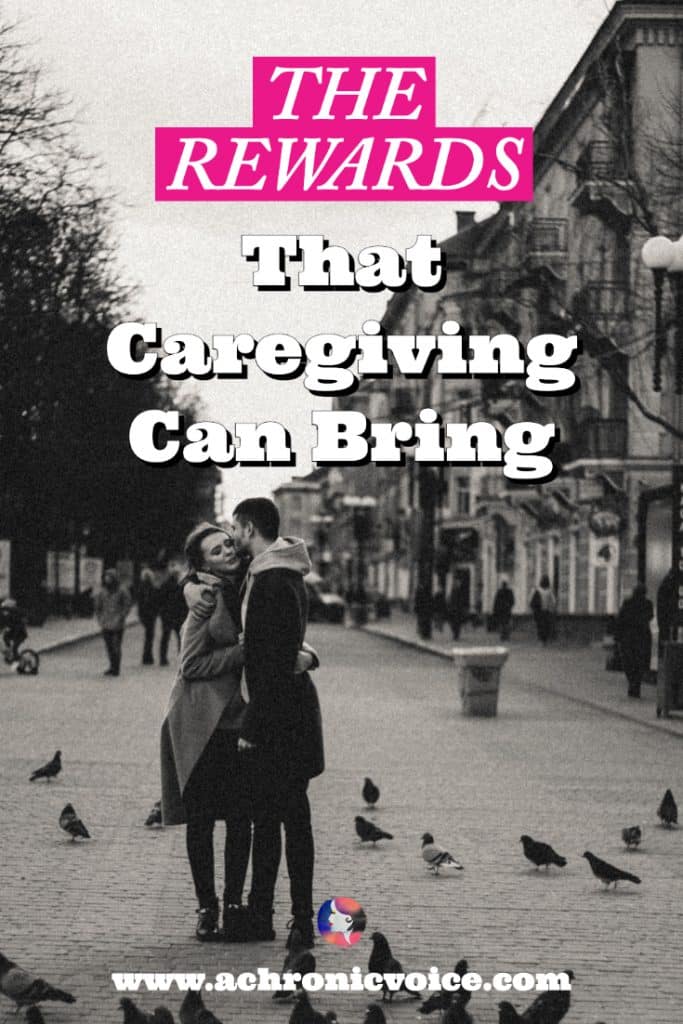
Conclusion
If you recently became a caregiver for a chronically ill person, know that it is a challenging but incredibly rewarding role. You will be faced with many challenges, but you will also have the opportunity to deepen your relationship, learn new things, and make a difference in the life of someone you love.
Not only will you be providing them with the support they need, but you will also be gaining a greater understanding of and empathy for the person you are caring for.
So, embrace the challenges and savor the rewards. They will make you a better person and a better caregiver.
*Note: This guest post is meant for educational purposes and is based on the author’s personal experiences. It is not to be substituted for medical advice. Please consult your own doctor before changing or adding any new treatment protocols.
If you liked this article, sign up for our mailing list here so you don’t miss out on our latest posts! You will also receive an e-book full of uplifting messages, quotes and illustrations, as a token of appreciation!
Pin to Your Chronic Illness & Caregiver Boards:
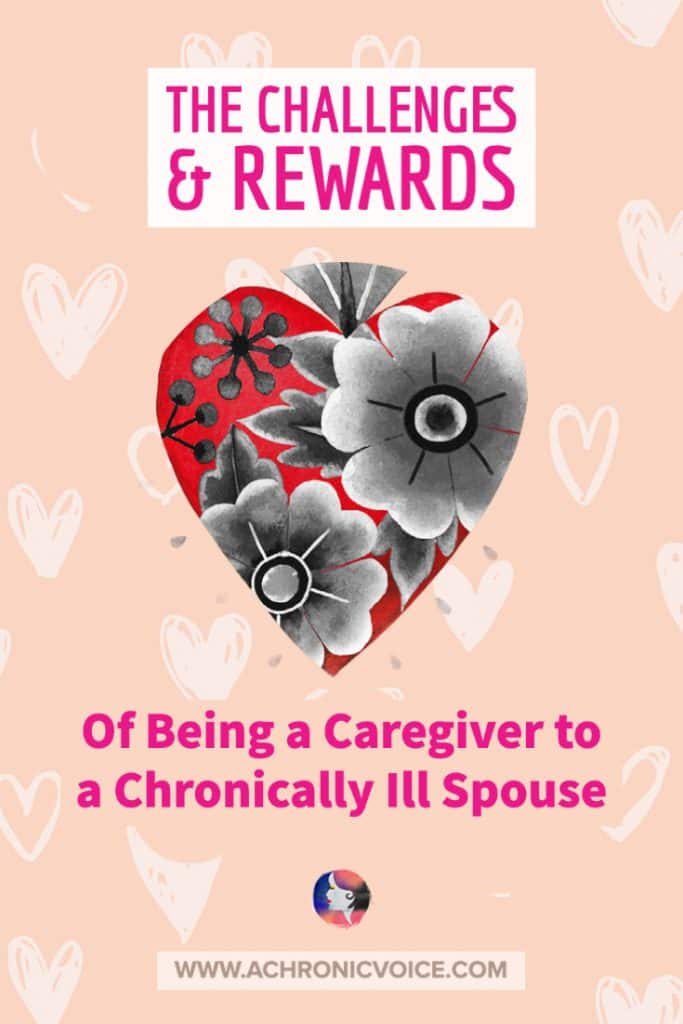
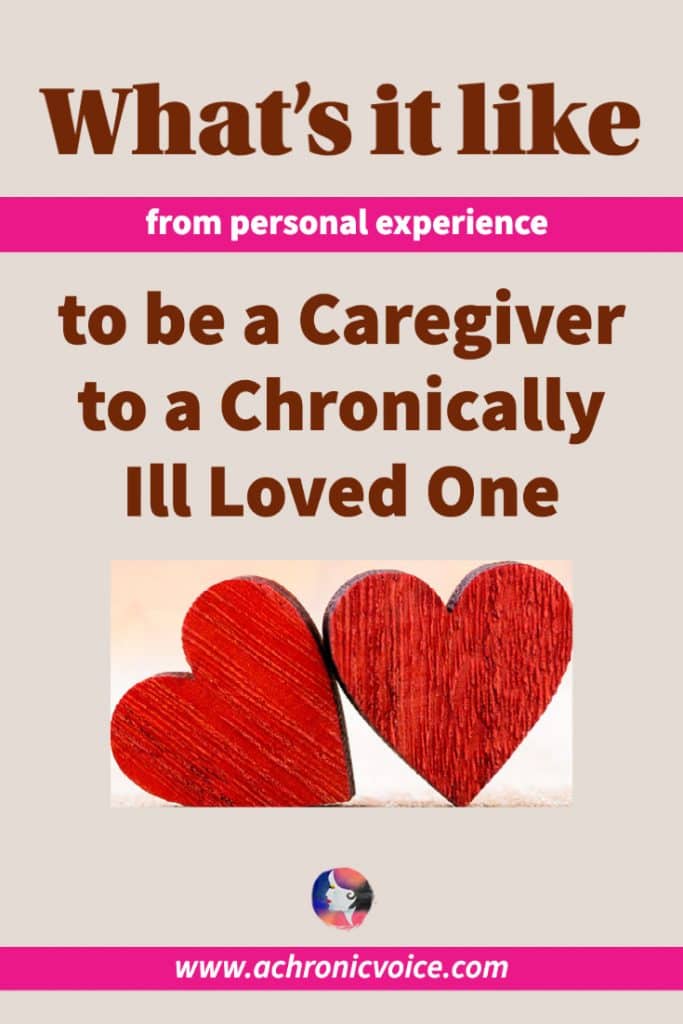
Contributor Bio


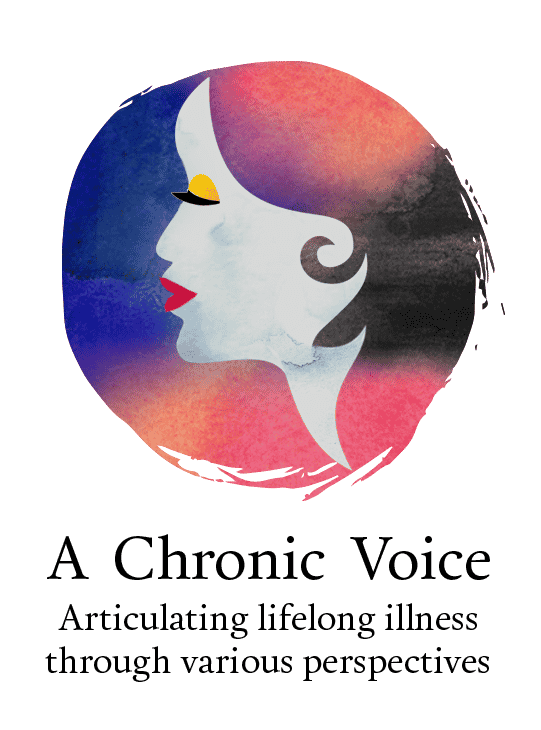

Thank you all for your kind words, it must be unbelievably and impossibly hard for people who go through the illness alone.
For those who have a loved one, there is a new world of gratitude and appreciation to the little things in life that most healthy people always overlook. Chronic conditions can bring you both closer.
Even though I’m healthy like a bull, I am very humbled to belong to the wonderful chronic illness community.
Thank you Sheryl 🙂
Thank you all 🎗
Very moving. For the environment, the caregiver is often the invisible presence, taken for granted. “How is . . .?” – never: “how are YOU coping with this situation?” The focus is mostly on the ‘patient’. It’s not so much a gender thing, but really the unquestioned assumption that the ‘healthy’ person is therefore without distress. But s/he too, has their disappointments, feelings of helplessness, the loss of the life together that ‘could have been’. I am the one who needs care, which presented my wife with her personal thresholds. “I don’t know myself in this situation” she said recently. The search for a new identity, not just for her, but also for the identity of our relationship. After all, we each have our biography, but in a marriage, those biographies merge and then: ” I am I, and you are you. And we are both each other too.” But that may only go so far – she has a life that is hers. And so, every so often, we arrange alternative assistance, and she goes away, on holiday, visiting family, whatever, for at least three days, sometimes a week or more. To make that work is not only possible, but very necessary. My very best wishes.
Thank you for constant support of the blog, Arjan. It’s good to hear from male voices always, as they are fewer and far between, I personally think. Your wife makes a very good point regarding identity, and you sum it up well about relationships and the compromises needed to make it work, which I think are always worth it if you love each other.
The idea of being invisible definitely happened to me when I was taking care of my young son with cancer. No one asked how I was doing? The same thing happens as I take care of my aging parents. I enjoyed reading about the perspective of a caretaker.
I am glad for people like Lucjan who share about his perspective as a caregiver with such compassion and so objectively. If any other caregivers ever wish to guest post on the blog – let me know 🙂
Thank you to both of you, Sheryl and Lucjan for sharing this important post. I live with fibro and do need care from my husband some of the time but not that much fortunately. It was so interesting and touching to hear a caregiver’s voice as this perspective is so overlooked.
Thank you again and best wishes to all of you
Sarah x
Thank you, Sarah! I agree that caregiver voices need to be heard louder and clearer. They too need support and should always be appreciated as human beings like all of us 🙂
Sheryl, thank you for sharing Lucjan’s post.
My husband is my carer and I could relate to everything Lucjan wrote about. I try to be fairly independent when I can, but on those bad days (too many lately), I rely on him so much. I don’t know how I would manage without him but I also feel bad that his life is also ruled by my pain.
Carers need much more recognition for what they do.
Lucjan, you’re doing an amazing, but difficult, job.
Hi Liz, I do recall you sharing from our podcast interview! Thank you for reading the post. What your husband and Lucjan do is amazing and out of pure, unconditional love. The very essence of humanity 🙂
So familiar. What my husband would say. What he did say in the book we co-wrote so people could see what it’s like for the caregiver. (Sunbreaks in Unending Storms) Glad you’re helping get the message out!
Thank you Carole, and thank you for writing your book with your husband, too. I think that caregivers’ voices should be heard too; they need just as much support!